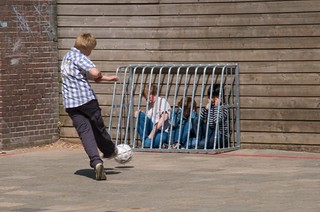What To Do If Your Child Has Violent Tendencies
Most parents have the highest hopes and anticipation for our children. When your visions of success and happiness are thwarted because of your child’s violent tendencies, parents may be tempted to deny that your child needs help or that your child’s tendencies will resolve themselves over time. However, ignoring or prolonging your offspring’s violent outbursts is the worst course of action you can take if you hope to restore any desires that your child will be happy and successful in the future.
Rather than give into the worry, fear, embarrassment, and stress that come with having a violent child, parents can instead take these prompt and necessary steps to lead your child to a healthy and meaningful future.
What Makes A Kid Violent?
It’s been proven that excessive exposure to violence through popular media like movies, TV shows and video games contribute to a child’s violent behavior. It desensitizes children to the violence and can make them adopt aggressive behavior. By the time a typical American child reaches the age of 18, he has already been exposed to almost 200,000 acts of violence seen on TV. Popular video games like Grand Theft Auto also rewards violent and destructive behavior.
If a child has suffered some trauma to his brain, this injury can also add to his violent behavior. Use of drugs and alcohol, violence or economic strain in the family can be factors too. Children at risk are those who have problems with being impulsive, irritable, and easily frustrated.
Accept The Problem For What It Is
Some parents may be ready to gloss over your child’s emotional and mental outbursts as a normal developmental stage or a bout of immaturity that will surely go away over time. Minimizing your child’s violent tendencies, however, only serves to deflect the responsibility of getting your child much needed help and addressing the issue for what it really is. Many parents avoid recognizing your child’s outbursts because you may feel embarrassed or that you are to blame for your child’s behavior. Instead of focusing on how you feel, however, you should think ahead about what is best for your child and act promptly to get your son or daughter the professional help they need.
As parents, you must also think of the safety of other children, like siblings or schoolmates, who might be at the receiving end of mean acts. Is your violent child being a typical “brat” or is he taking bullying to a dangerous level? Does he need constant monitoring because he is not to be trusted with playing nice or being left alone with other kids?
Seek Help Through The Professional Community
You may try to keep your child out of the medical establishment by taking your offspring to counseling sessions with religious leaders or natural healers. While it may be perfectly acceptable to adhere to religious or lifestyle beliefs during your child’s recovery, parents are still encouraged to seek out qualified medical help for your child’s violent tendencies. A team of doctors, licensed psychiatrists, and mentors are the ideal choices for heading up a child’s emotional and mental treatment.
In the case of a troubled child, the causes might come from social issues which need to be addressed. A specialist in juvenile justice who also happens to work as a life coach in Seattle for at-risk kids, suggests that the child’s failure to thrive could be because of an addiction, and that he could use help with “releasing stress, reframing and keeping boundary maintenance, and improved communication.” A child may have to be hospitalized, put on medications, or go through other intense medical therapies that can help him recover from the emotional or mental distress that causes his violent behavior. The coach also works with the whole family, to help repair the dynamics between the child and his parents and siblings. Each child is different so the course of action for your particular family would be worked out by the coach with your family’s participation.
Commit To Long-Term Monitoring And Care
Once your child has been treated and shows signs of improvement, don’t be quick to dismiss his behavior and believe that the problem is resolved permanently. Few children recover quickly from violent emotional and mental behaviors. Many kids face years of treatment for their behavior, making it necessary for their parents to commit to a long-term care plan that ultimately should lead to the child’s successful recovery. Falsely believing that the treatment will be short-lived and resolved in a few short weeks or months can set you up for disappointment and frustration.
Work As A Parental Team
Parents whose children show signs of violent behavior may be quick to blame each other. It is vital that you realize that blaming your spouse only leads to a breakdown of your relationship with each other and your entire family’s structure. For the sake of your child and his siblings, parents must work together to focus on his recovery. Showing a unified front can give the troubled adolescent the reassurance he needs to commit to his medical treatment.
When children show signs of violent behavior, parents should not hesitate to act quickly and get their child the help he needs. By taking these important and urgent steps, parents can lead their son or daughter to a healthy and happy recovery.
Debbie Nguyen is a writer who likes to blog about children’s difficulties and how parents can best help resolve them. She has first-hand experience with her two teens.
Photo Credit: http://www.flickr.com/photos/trixer/3531445744/

You will be glad you did and so will your child.

